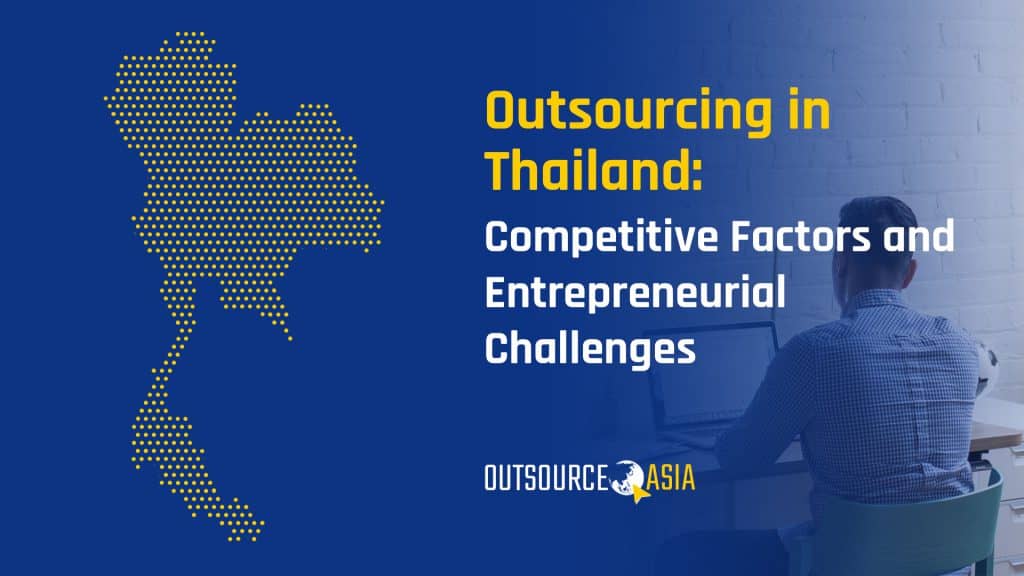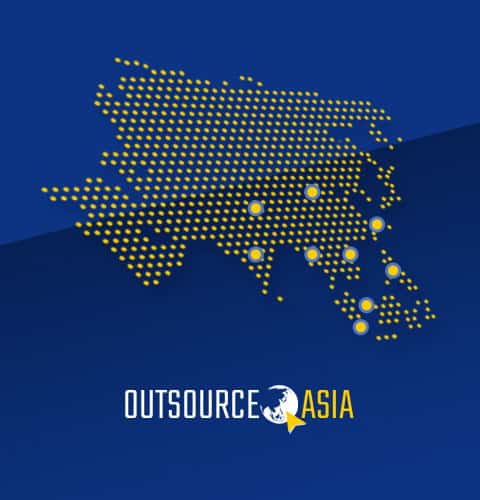Thailand’s outsourcing industry is stepping up as a promising player alongside traditional outsourcing heavyweights: the Philippines and India.
According to the World Bank, the Thai Gross Domestic Product (GDP) in 2019 was at $544 billion, representing 0.45% of the world economy. A booming tourism and export recovery as well as development of private healthcare, commercial, and industrial sectors spurred this growth. This opened many opportunities to outsourcing service providers and facilities management (FM) providers.
The country’s contact center application market experienced an 8.4% Compound Annual Growth Rate (CAGR) in 2017 which generated $17.8 million in annual revenue. A 4.7% CAGR is forecasted by the end of 2024.
The market size for Thai’s in-house facilities management market and outsourced facilities management market in 2017 was estimated at $1.8 billion and $1.84 billion, respectively. The total workforce for the FM sector is 38 million, where 40% of the workers were outsourced.
COMPETITIVE OUTSOURCING FACTORS
Rapid Growth of Manufacturing Sector
Under the country’s current Thailand 4.0 policy, economic transformation will be propelled by adoption of smart technologies, green technologies, and higher technologies. This “growth via innovation” strategy will have widespread impact on its manufacturing sector using the following new technologies:
Cloud: enable companies to have low-cost options to thrive in the digital era
Knowledge Automation: replication – not replacement – of skilled human work
Robotic Process Automation: improve efficiency and accuracy in doing repetitive work in various industries; minimize costs and operational expenses in managing algorithmic big data collection and analysis
Blockchain: make data sharing possible for users; ensure easy but highly secure data retrieval/storage
Internet of Things (IoT): utilize 5G wireless technology to support and manage technologically intensive supply chain work in smart factories such as in electronics and automobiles; use in retail stock management and in the healthcare sector
3D Printing: rapid design and production of goods at a more affordable price – very useful for industries such as auto parts, machinery & equipment, electronics, and even fashion
Thai’s manufacturing sector has already contributed up to 40% of the country’s GDP in 2019. Having access to a suite of advanced technologies and digital enterprise solutions will enable companies to be digital-ready and to carry out smart innovations – making the road towards an Industry 4.0 era a reality.
Remarkable Progress In Expanding Economic Freedom
Thailand’s status from a low-income to an upper-middle income country in 2011 was the result of a four-decade effort to focus on economic development, positive investment climate, and legislative reform. If the 2020 Index for Economic Freedom is the basis, Thailand’s overall score is at 69.4 – ranking 43rd among 171 countries around the world and 11th among all nations in the Asia-Pacific region.
One of the main objectives for improving labor freedom, regulatory efficiency, and market openness is to attract foreign investments that is crucial not only for breaking poverty chain but also for boosting growth trajectory and economic-wide performance in the entire country. Today, Thailand is widely regarded as one of the most ideal ASEAN countries for foreigners looking to expand their business activities and operations.
Generous Incentives to Boost Private Investments in Automation Industries and Technologies
Thailand envisions an innovation-driven economy that will lead all the way through an automation-driven future. A $45 billion budget is already dedicated for the creation and/or development of smart cities, human resources, robotics innovation, and modern logistic systems. Private investments in automation industries and technologies are highly encouraged. All businesses and companies involved will be incentivized by:
- Use of product innovations to support operational efficiency within their factories
- Soft loans for SMEs adopting robotics and automation technologies into their production processes
- Three-year 50% reduction on corporate income tax and exemptions eligibility for imported machinery
- Eight-year tax holidays and tax exemptions for exported raw materials
- Waived corporate income tax for 13 years for investments made in the Eastern Economic Corridor (EEC) area
All these attractive incentives prove that the Thai government is committed to making its product innovations attractive to potential overseas buyers, foreign investors, and outsourcing manufacturers.
ENTREPRENEURIAL CHALLENGES TO OUTSOURCING
Unavailability of Technologically Competent Labor
Thailand’s public and private tertiary education is unable to keep pace with industry demands which results to ill-equipped graduates for technical and vocational tasks in a wide range of industries. Failure to make significant changes in the Thai education system won’t just rob students of the opportunity to develop the right skills for the job market; it will lead to a chronic shortage of skilled labor – the worst in the region, according to the World Bank.
‘Immature’ Digital Culture Within Organizations
Digital transformation is no longer a fully embraced concept exclusively among multinational corporations and trillion-dollar companies. It is essential for any modern business today, because it’s about utilizing available emerging technologies that can lead to a more convenient, more personalized, and more secure buying experience among target customers.
However, it can be a confusing and very expensive journey for startups and small and medium-sized businesses in Thailand. Despite rapid tech adoption among many Thai companies and integration of advanced digital tech tools into business operations, organizations face a bigger obstacle: immature digital culture within the organization. Digital transformation isn’t mere automation of manual processes; it’s having a digital mindset and harnessing digital technologies to disrupt current business models.
Lack of access to the wider market or relevant investors, lack of opportunities to upskill or re-skill, and lack of data privacy and security are all hindrances to a genuine digital transformation. These issues, however, did not go unnoticed as the Thai government is working non-stop to build its tech ecosystem that will result to fully digitalized organizations capable of creating high-value products and services for consumers.
Weak Cybersecurity Infrastructure
Without effective security strategies in place, it would be difficult to adopt digital capabilities, attract foreign investments, and aspire for sustainable economic development. A Cisco’s 2019 study revealed that 35% of Thai businesses suffered at least $1 million damage or loss due to cybercrimes. In 2015, Thailand was declared as the 2nd worst country for cybersecurity after it was revealed that 20% of its cybercrime victims experienced losses of no less than $100,000. Rising cases of data leaks in 2018 triggers IT security concerns among citizens and businesses alike, which puts into question the effectiveness of its existing Telecom Business Act in protecting customers’ personal data and in ushering the country into digital transformation through its Thailand 4.0 policy. Currently, the Thai government is taking action to boost its cyber-resilience and to improve organizations’ capabilities to safeguard personal and financial data.
Conclusion
Thailand offers competitive outsourcing advantages, but you also must consider your company’s specific needs and requirements before entering into an agreement with an outsourcing service provider in the country. If you need more information on finding the right outsourcing partner for your business, read more here.


